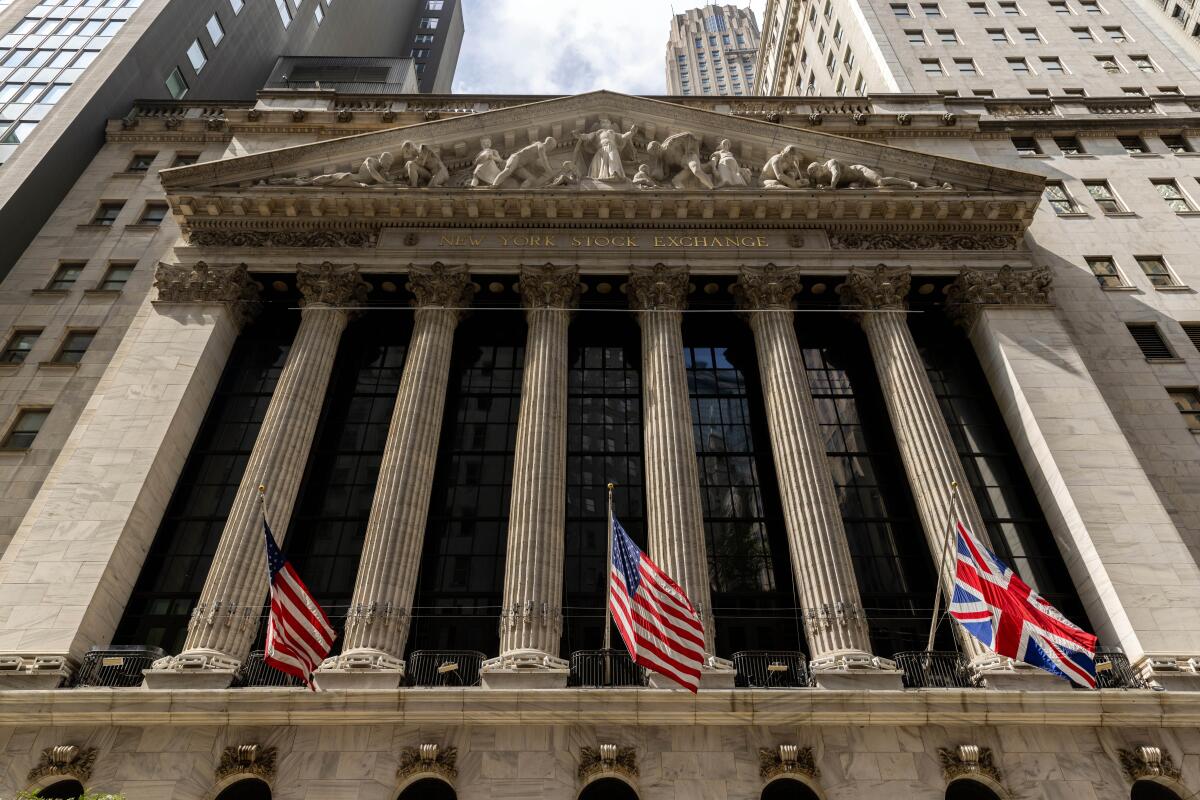S&P 500 breaks 5-day losing streak

- Share via
Technology companies helped lift stocks Thursday, ending a five-day losing streak for the Standard & Poor’s 500, though the major indexes remain on pace for a weekly loss.
The Standard & Poor’s 500 rose 0.8%, while the tech-heavy Nasdaq composite closed 1.1% higher. The Dow Jones industrial average added 0.5%.
Major indexes are all in the red for the week and have been swinging between big monthly gains and losses throughout the year. Investors’ worries about inflation, rising interest rates and recession risks have made for a volatile market. That has also left Wall Street focused on data points on the economy, especially those regarding inflation.
“We’ll continue to see outsized moves in the markets over the coming months,” said Jeff Kleintop, chief global investment strategist at Charles Schwab. “We’re going to be feeling our way through and there’s going to be a lot of volatility.”
The S&P 500 rose 29.59 points to 3,963.51. The Nasdaq gained 123.45 points to 11,082, and the Dow rose 183.56 points to 33,781.48.
Tech companies powered much of the rally, along with healthcare companies and retailers. Chipmaker Nvidia climbed 6.5%, Pfizer rose 3.1% and Nike gained 2.8%.
Communication services stocks posted some of the biggest losses. T-Mobile US slid 3.3%.
Energy stocks also fell. The price of U.S. crude oil settled 0.8% lower at $71.46 per barrel, another low point for the year. ConocoPhillips dropped 2%.
Activision Blizzard lost 1.5% after the Federal Trade Commission said it is suing to block Microsoft’s planned $69-billion takeover of the video game company, saying it could suppress competitors of its Xbox game consoles and its growing game subscription business. Microsoft rose 1.2%.
Small-company stocks gained ground. The Russell 2000 index added 11.39 points, or 0.6%, to close at 1,818.29.
Bond yields rose. The yield on the 10-year Treasury note, which helps set mortgage rates, rose to 3.49% from 3.42% late Wednesday.
Markets in Europe closed mostly lower, while markets in Asia ended mixed.
On Thursday, the U.S. reported that slightly more Americans filed for jobless claims last week, but not as many as economists had forecast. The labor market remains one of the strongest pockets of the economy, which has been stifled under the weight of stubbornly hot inflation and rising interest rates.
Low unemployment is good for the broader economy but makes it more difficult for the Federal Reserve to tame inflation. The central bank has been raising interest rates to curb borrowing and spending in order to cool the hottest inflation in decades. Its benchmark interest rate sits at 3.75% to 4%, the highest in 15 years.
The Fed will meet next week and is expected to raise its benchmark interest rate by half a percentage point.
Resilient consumer spending, which is partly tied to strong employment, has also made the fight against inflation more difficult. It has been keeping the economy strong enough to stay out of a recession, analysts have said, but it is also increasing the chances that the Fed will go too far in raising interest rates. The Fed could potentially cause a recession by hitting the brakes too hard on the economy.
Wall Street will get more insight into how consumers feel about inflation and the economy on Friday when the University of Michigan releases its consumer sentiment survey for December. Investors will also get an update on how inflation is affecting businesses when the government releases its monthly report on wholesale prices Friday.
Associated Press writers Elaine Kurtenbach and Matt Ott contributed to this report.
More to Read
Inside the business of entertainment
The Wide Shot brings you news, analysis and insights on everything from streaming wars to production — and what it all means for the future.
You may occasionally receive promotional content from the Los Angeles Times.










